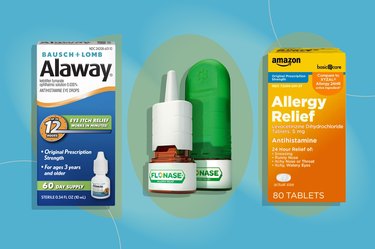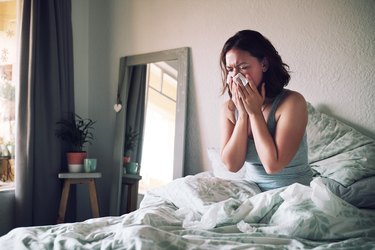
Toasting with a glass of bubbly can be a festive way to celebrate a special event. But if you start to feel funky afterwards, you might wonder if you have a champagne allergy.
Around 10 percent of people report being hypersensitive to alcohol, according to a September 2018 paper in Allergologie Select. That said, experiencing unusual symptoms after you drink champagne doesn't necessarily mean you're allergic to the stuff.
Video of the Day
Video of the Day
"True champagne allergies are rare. I've not actually seen a true champagne allergy before," says Christopher Brooks, MD, an allergist/immunologist at The Ohio State University Wexner Medical Center in Columbus. "Most reactions related to champagne are intolerances, often related to how our body processes alcohol."
Here's how to tell what you might be dealing with and what to do about it.
Allergies vs. Intolerances
Food allergies and food intolerances can both cause uncomfortable reactions. But they stem from two different causes and tend to trigger different symptoms, Dr. Brooks says.
Food allergies are immune system responses where the body mistakenly identifies proteins in a food or drink as a foreign invader, according to the American Academy of Allergy Asthma & Immunology (AAAAI).
When a person with an allergy consumes even a tiny bite or sip of the offending substance, their immune system launches an inflammatory response, which can cause skin, respiratory and gastrointestinal symptoms. In some cases, the reaction can be life-threatening.
Food intolerances are not immune system responses. Instead, they're responses that occur when the body isn't able to properly break down a food. That can be because a person is lacking a certain digestive enzyme (like with lactose intolerance), or because a person is simply sensitive to certain food additives or naturally occurring chemicals, Dr. Brooks says.
That said, some people with an intolerance find very small amounts of the irritating food or drink don't cause problems, per the AAAAI.
Allergens in Champagne
Champagne comes primarily from grapes, but other ingredients are also used during the manufacturing process. Any of these things can potentially be the culprit behind an allergy or an intolerance.
According to the Allergologie Select paper, potential allergens in champagne include:
- Grapes
- Fish gelatin or isinglass, which are used to filter wine or champagne
- Enzymes
- Molds
- Yeasts
Intolerances are often caused by different ingredients or additives. Dr. Brooks notes that the most common culprits found in champagne are:
- Sulfites
- Tannins
- Histamines
Symptoms of a Champagne Allergy
If you have reactions after drinking champagne, your symptoms can often clue you in to whether you're dealing with an allergy or an intolerance.
According to the AAAAI, common allergy symptoms include:
- Skin symptoms like hives, swelling or itching
- Respiratory symptoms like coughing or shortness of breath
- Gastrointestinal symptoms like abdominal pain, vomiting or diarrhea
- Dizziness or lightheadedness
- Anaphylaxis, a life-threatening allergic reaction that can cause trouble breathing or low blood pressure
The symptoms "happen within three hours of ingestion, typically within one hour," Dr. Brooks says. And they'll happen every time you drink champagne, even if it's just a sip.
Intolerances tend to cause a different set of symptoms. Per the Mayo Clinic, they include:
- Facial redness or flushing
- Stuffy nose
- Red or itchy skin
- Worsening asthma symptoms, if you have asthma
- Nausea or vomiting
- Diarrhea
You might not feel good after drinking champagne if you have an intolerance. But unlike a champagne allergy, an intolerance doesn't pose the potential for life-threatening reactions like anaphylaxis. You might also find that you can have a few small sips without triggering your symptoms, per the AAAAI.
Warning
Champagne and other food allergies can potentially cause anaphylaxis, a life-threatening reaction that requires immediate medical attention, according to the AAAAI. It typically happens within 30 minutes of consuming an allergen and causes multiple symptoms. Warning signs include:
- Chest tightness
- Coughing
- Diarrhea
- Feeling of impending doom
- Pale or very red skin
- Passing out
- Red rash or welts
- Stomach cramping
- Swollen throat
- Trouble breathing or swallowing
- Vomiting
- Wheezing
Champagne Allergy Risk Factors
While anyone can potentially have a reaction to champagne, certain groups are more prone than others. You're more likely to have a champagne allergy if you have a history of other allergic conditions like eczema, asthma, seasonal allergies or other food allergies, Dr. Brooks says.
Champagne or alcohol intolerances can have a genetic component, and they're more likely to occur in people of Asian descent, per the Mayo Clinic.
People with asthma also have a heightened risk of being sensitive or intolerant to sulfites, which can irritate your airways and worsen or trigger breathing problems, Dr. Brooks says. (Sulfites are a preservative found in champagne and other types of alcohol, as well as in dried fruits, pickled onions, soft drinks and other packaged foods.)
How Is a Champagne Allergy Diagnosed?
Allergies can be diagnosed with simple medical tests. However, it can be tougher to diagnose an intolerance.
If your doctor thinks you have a champagne allergy, they'll conduct skin or blood tests to expose you to a small amount of the offending allergen. If the tests show a reaction (like skin swelling or redness), your allergy is confirmed.
There aren't any diagnostic tests for an intolerance, so it comes down to paying attention to how you react when you drink champagne.
"The only true way to diagnose an intolerance is by finding a doctor that listens to your symptoms and uses their medical knowledge to tell you the most likely diagnosis," Dr. Brooks says. If you tend to get flushed or have a headache any time you have a glass of wine or champagne, for instance, there's a good chance that you have an intolerance. (As for those at-home food sensitivity tests? They're not all that accurate.)
Treatment and Prevention
Whether you have a champagne allergy or intolerance, in order to avoid symptoms, "the best thing to do would be to avoid champagne," Dr. Brooks says.
That's especially important if you have an allergy, because even a small amount could trigger a life-threatening reaction like anaphylaxis. Your doctor might also recommend carrying an Epi-Pen to help prevent anaphylaxis if you accidentally consume champagne (which seems unlikely, but being extra careful never hurts).
If you have an intolerance, "you may find you may be able to tolerate a small amount of champagne without issues," Dr. Brooks says. That said, it might take some experimentation to find out just how much you can drink before your symptoms start to flare up. And if you'd rather just steer clear altogether, that's fine, too.
It's also worth talking with your doctor about other foods or drinks that could cause similar symptoms, depending on what champagne ingredient or additive you're allergic to.
When to See a Doctor
Champagne isn't an everyday drink for most people. So if you notice it causes mild symptoms but you're able to easily steer clear, "you can probably just avoid champagne without figuring out the cause," Dr. Brooks says.
However, you should let your doctor know if you're having a severe reaction or are experiencing symptoms after eating or drinking multiple types of foods. Together you can talk through your symptoms to decide if you should undergo allergy testing.
Was this article helpful?
150 Characters Max
0/150
Thank you for sharing!
Thank you for your feedback!
Is this an emergency? If you are experiencing serious medical symptoms, please see the National Library of Medicine’s list of signs you need emergency medical attention or call 911.


